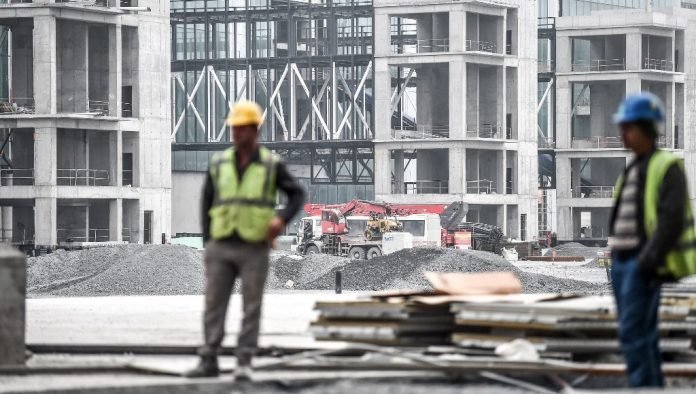Occupational safety experts have criticized a recent directive by Minister of Environment, Urbanization and Climate Change Murat Kurum instructing contractors in earthquake-affected areas to work “24 hours a day” to fulfill President Recep Tayyip Erdoğan’s pledge to deliver 452,958 new homes by the end of 2025.
Speaking to the Bianet news website, Health and Safety Labor Watch (İSİG) General Coordinator Murat Çakır said a quarter of work-related accidents occurred on construction sites in Turkey’s southeastern provinces, where there have been efforts to rebuild housing for victims of earthquakes that struck the region on February 6, 2023.
The magnitude 7.8 and 7.5 earthquakes claimed the lives of 53,725 people, injured more than 107,000 and left millions homeless after the collapse of 518,000 homes. According to most recent data nearly 650,000 people are still living in container cities waiting to find a house.
Although Erdoğan pledged that his government would deliver thousands of houses merely months after the disaster, many viewed his remarks with skepticism and found his promise unrealistic since even removing the rubble would take months, and Turkey’s economic situation and human resources were insufficient for completing such a huge project in a short period of time.
“Under this kind of pressure to complete work on time, safety precautions will not be taken, and laborers will be made to work in unhealthy and unsafe conditions. This will lead to the death of many of them,” Çakır said.
Pointing out that the number of construction worker deaths has significantly increased in the 11 provinces affected by the earthquakes, Çakır added, “In the first year after the earthquakes, deaths occurred during excavation work in the region. In the following period, during 2024 and 2025, fatal workplace accidents occurred during construction activities. A quarter of all construction worker deaths in Turkey are occurring in these regions alone. This shows just how intense construction activity is in the area.”
Çakır explained that according to Social Security Institution (SGK) data, there has been a 10 percent increase in workplace accidents in the area. He added that collapses, falls from heights and the death of underage workers had also reached alarming levels.
Çakır also drew attention to the high number of uninsured workers and the poor living conditions on construction sites. He said there were workers who did not receive regular pay or have access to clean water. Moreover, there were workers who labored up to 14 hours a day, some of them driving trucks or climbing scaffolding while extremely tired.
Nusret Suna, chairman of the board of the Turkish Union of Engineers and Architects’ Chambers (TMMOB),told Bianet that so far, only about one-third of the housing units had been completed and at this pace, expecting the remainder to be finished by the end of the year was far-fetched. He explained that the figures promised by Erdoğan reflected a lack of planning, emphasizing that what was truly needed was for authorities to present the public with a clear and realistic plan.
“Of course, long working hours can be done on construction sites; however, the important thing to pay attention to here is the workers’ safety. If a person works eight hours a day, they also need eight hours of rest. If you make these people work at night as well, you can’t prevent workplace accidents. This leads to an increase in fatalities.”
People have been suffering from lax work safety standards for decades in Turkey, where workplace accidents are nearly a daily occurrence. In the worst work-related accident in the country’s history, 301 miners lost their lives in an explosion in Manisa’s Soma district in May 2014.
According to İSİG, more than 30,000 work-related accidents have taken place since the Justice and Development Party (AKP) came to power in November 2002.















